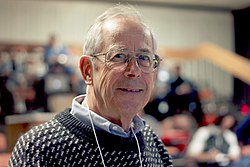 An interview with Jim Peebles, one of the world's foremost cosmologists and an emeritus professor at Princeton University, where since 1984 he was the Albert Einstein Professor of Science. With Robert Dicke he predicted the existence of the cosmic background radiation while he largely contributed to establishing the big bang model and furthering our understanding of the universe.
An interview with Jim Peebles, one of the world's foremost cosmologists and an emeritus professor at Princeton University, where since 1984 he was the Albert Einstein Professor of Science. With Robert Dicke he predicted the existence of the cosmic background radiation while he largely contributed to establishing the big bang model and furthering our understanding of the universe.